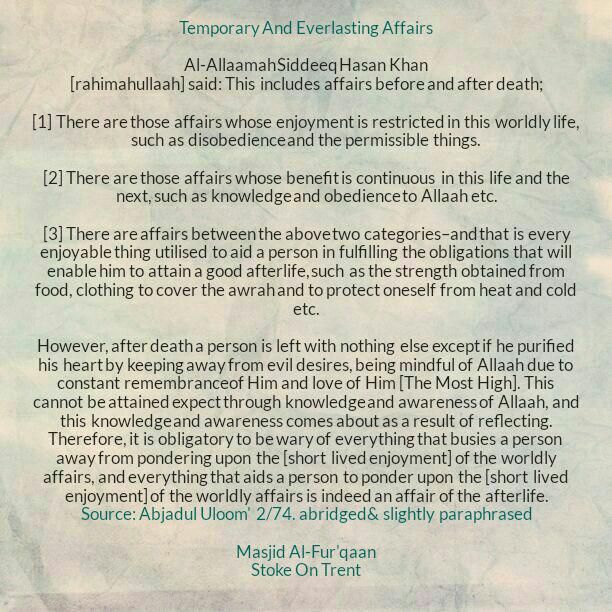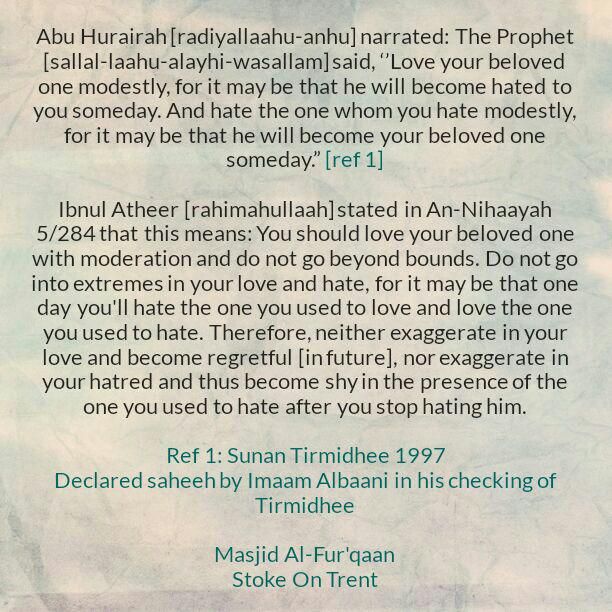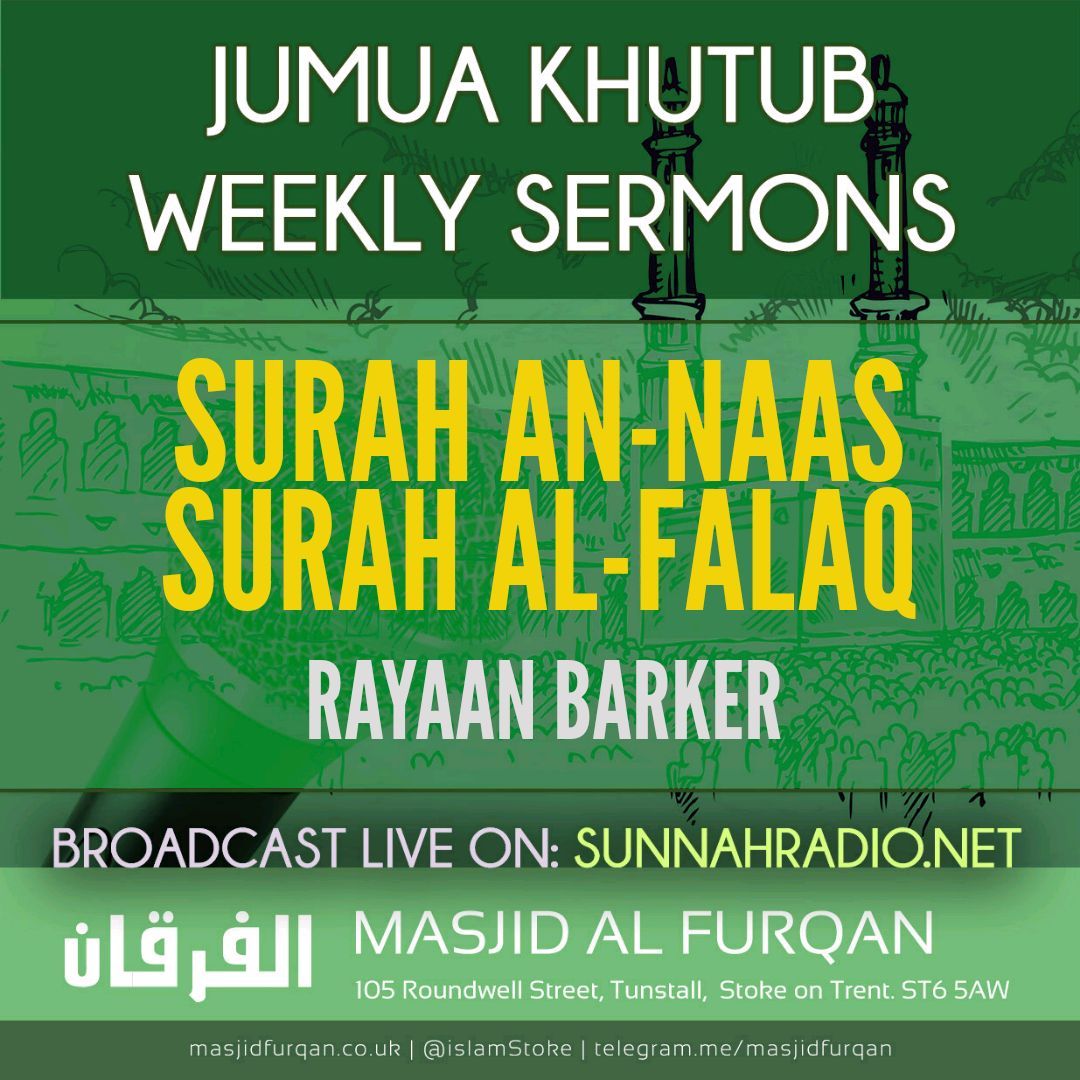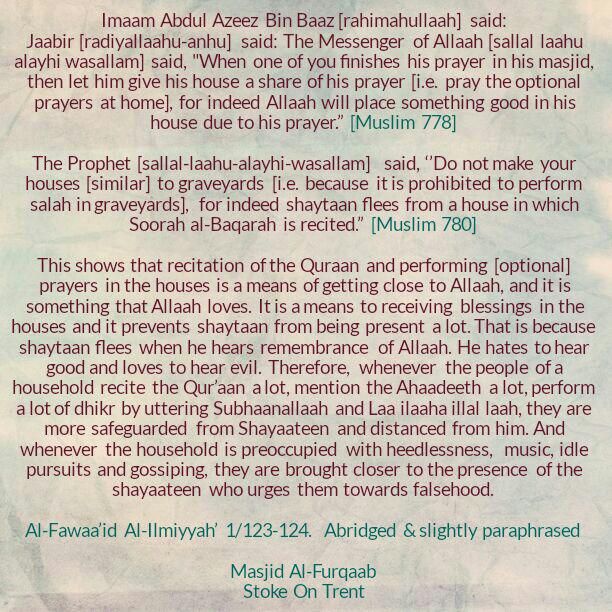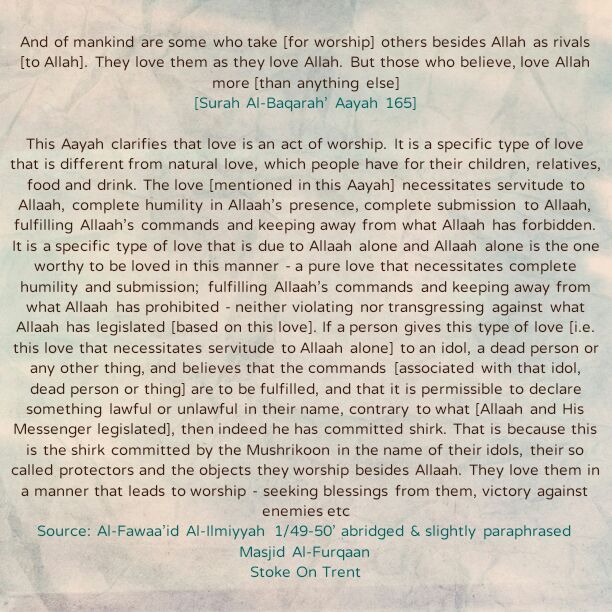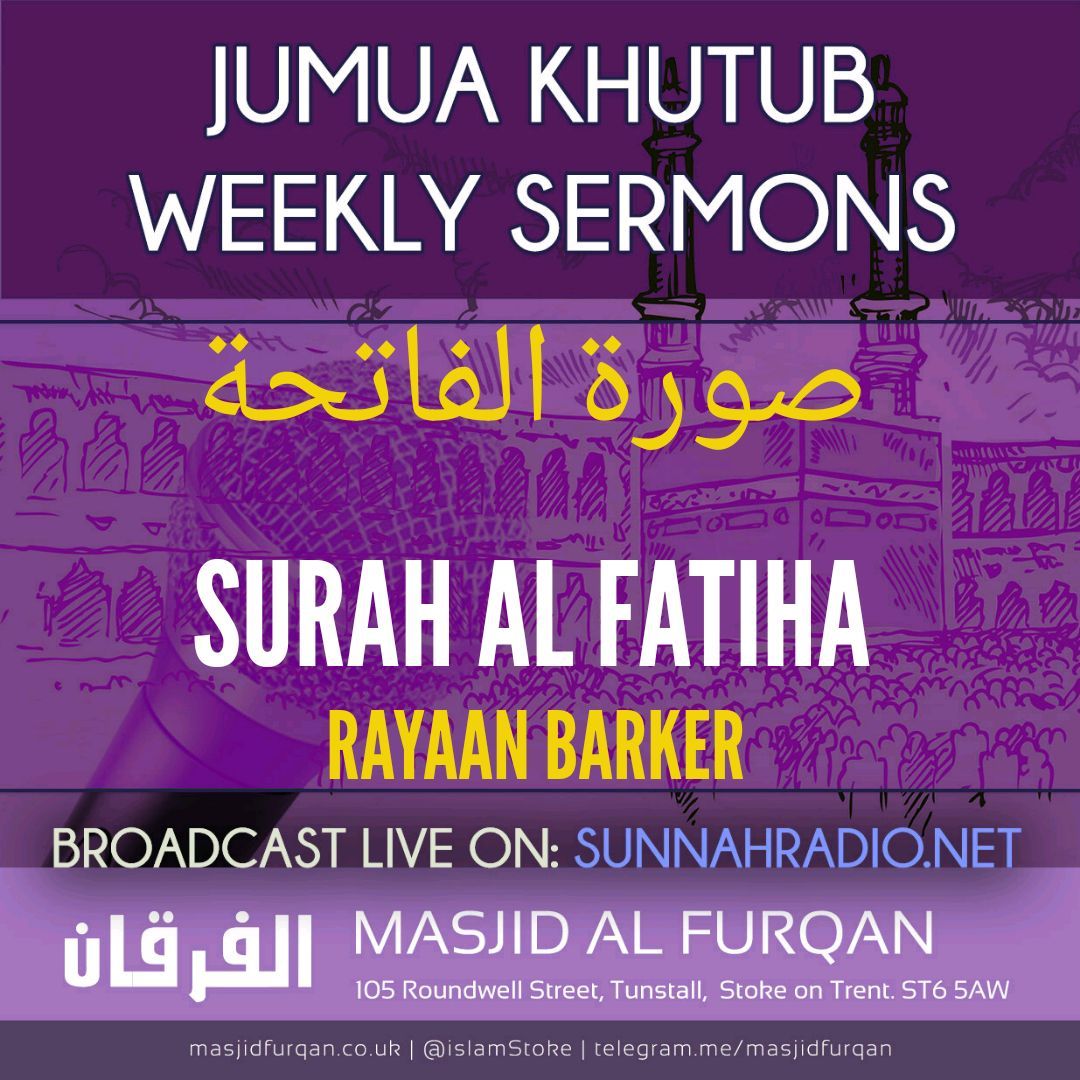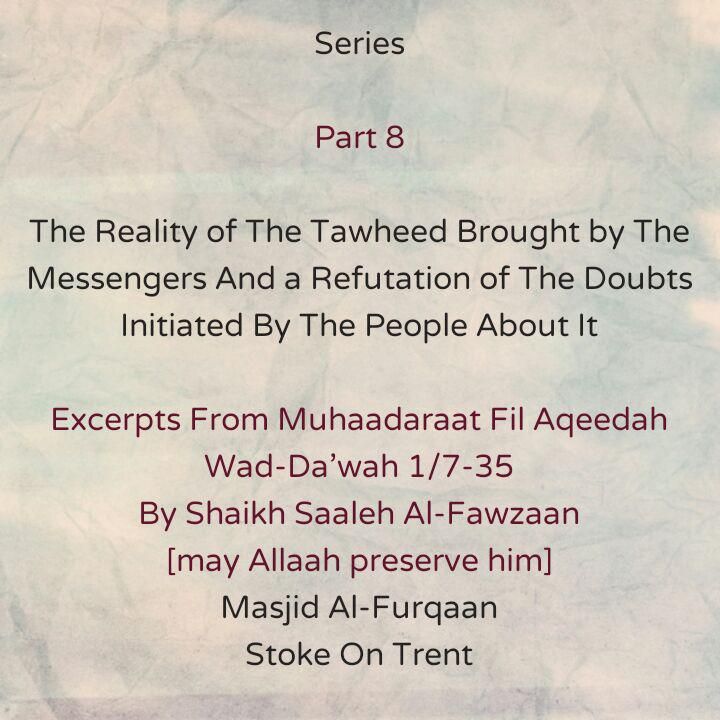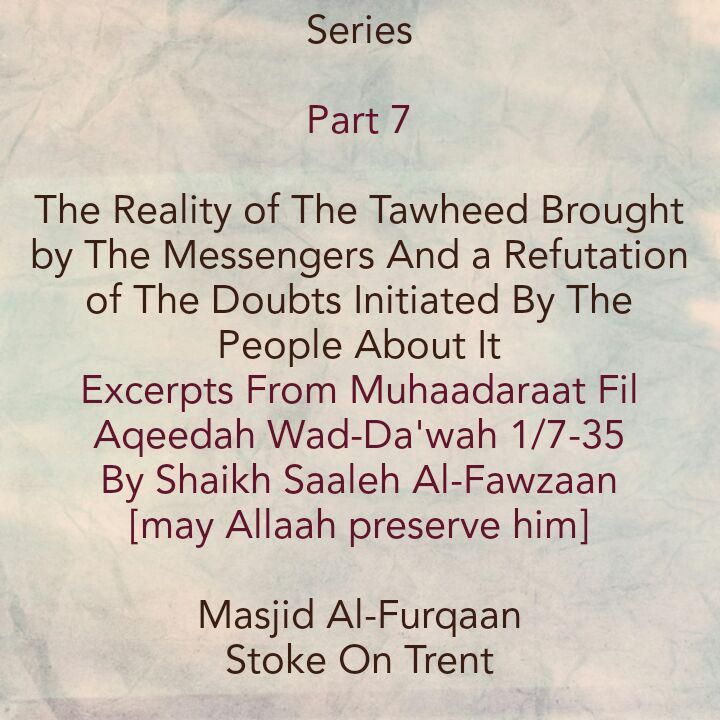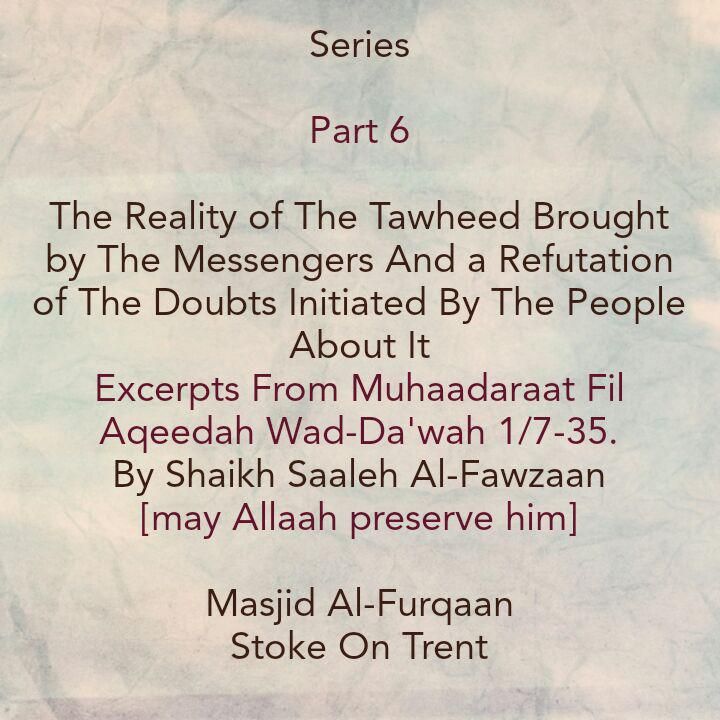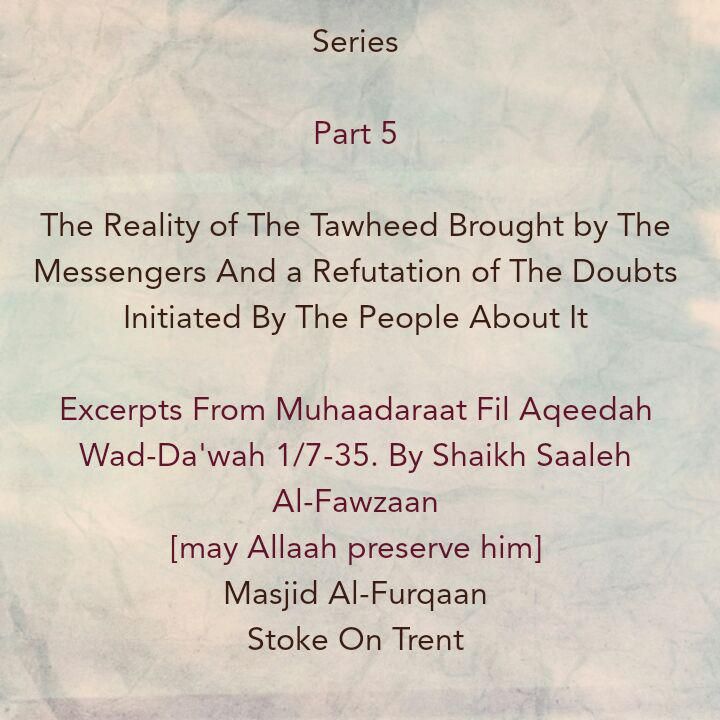In The Name of Allaah, The Most Merciful, The Bestower of Mercy
Shirk in worship is to devote acts of worship or some of it to other than Allaah. Indeed, we briefly saw how shirk started in the earth [Visit Link: http://masjidfurqan.co.uk/2017/10/30/4-the-reality-of-the-tawheed-brought-by-the-messengers-when-did-shirk-first-appear-on-the-earth/] and it has not ceased to exist amongst [mankind and jinn], except those whom Allaah has bestowed His Mercy [i.e. protected them from shirk]. Shirk is of two types. [Visit link: http://www.abukhadeejah.com/ahmad-an-najmees-kitaab-at-tawheed-chapter-3-fear-of-falling-into-shirk/]
And indeed, polytheistic [acts and beliefs] has become rife in this Ummah due to the people being distanced from the Qur’aan and the Sunnah; due to blindly following their forefathers without guidance; exaggerating the status of the dead people [i.e. either pious people or those whom they consider to be pious] and building [shrines and tombs over their] graves; and due to being ignorant of the [true] Islaam which Allaah commanded His Messenger [sallal laahu alayhi wasallam] to convey, just as Umar Ibnul Khattaab [radiyallaahu anhu] said:
“Verily, the [firm] foundations of Islam will be destroyed one after the other when arises in Islam a people who do not know what Jahiliyyah is [i.e. the acts and beliefs that were prevalent during the pre-Islamic era] [ref 1] [NB: Refer to ref 1 at the end of this article regarding the term Al-Jaahiliyyah’ at the end of this article’ (by the Shaikh Fawzaan)]
[And likewise, polytheistic practices and beliefs have become rife in the Ummah] due to the spread of Shubhah [i.e. doubts that are made to resemble the truth but are falsehood in reality] and stories that have misguided the majority of the people. And among these [Shubhah- doubts made to resemble the truth but are falsehood in reality] is what the people of Shirk of the past and those within this Ummah at present utilise as proof – that they follow the path of their fathers and ancestors, and that they inherited this creed [i.e. polytheistic beliefs and practices] from them, just as Allaah [The Most High] said: Az-Zukhruf Ayah 23]
وَكَذَٲلِكَ مَآ أَرۡسَلۡنَا مِن قَبۡلِكَ فِى قَرۡيَةٍ۬ مِّن نَّذِيرٍ إِلَّا قَالَ مُتۡرَفُوهَآ إِنَّا وَجَدۡنَآ ءَابَآءَنَا عَلَىٰٓ أُمَّةٍ۬ وَإِنَّا عَلَىٰٓ ءَاثَـٰرِهِم مُّقۡتَدُونَ
And similarly, We sent not a warner before you (O Muhammad) to any town (people) but the luxurious ones among them said: “We found our fathers following a certain way and religion, and we will indeed follow their footsteps.” [Surah Az-Zukhruf’ Aayah 23]
Everyone who is unable to establish proofs for his claim returns to this proof, even though it is a useless proof that has no weight in the arena of [sound] discussion; for indeed those ancestors they blindly follow were not upon [upright] guidance. Therefore, whoever [is upon such a state of affairs], it is not permissible to follow him and take him as an example. Allaah [The Most High] said:
أَوَلَوۡ كَانَ ءَابَآؤُهُمۡ لَا يَعۡلَمُونَ شَيۡـًٔ۬ا وَلَا يَہۡتَدُونَ
Even though their fathers had no knowledge whatsoever and no guidance. [Surah Al-Maa’idah’ Aayah 104]
Allaah [The Most High] said:
أَوَلَوۡ كَانَ ءَابَآؤُهُمۡ لَا يَعۡقِلُونَ شَيۡـًٔ۬ا وَلَا يَهۡتَدُونَ
Even though their fathers did not understand anything nor were they guided? [Surah Al-Baqarah’ Aayah 170]
Therefore, following ancestors is only praiseworthy if they were upon the truth. Allaah [The Most High] said that Yusuf [alayhis salaam] said:
وَٱتَّبَعۡتُ مِلَّةَ ءَابَآءِىٓ إِبۡرَٲهِيمَ وَإِسۡحَـٰقَ وَيَعۡقُوبَۚ مَا كَانَ لَنَآ أَن نُّشۡرِكَ بِٱللَّهِ مِن شَىۡءٍ۬ۚ ذَٲلِكَ مِن فَضۡلِ ٱللَّهِ عَلَيۡنَا وَعَلَى ٱلنَّاسِ وَلَـٰكِنَّ أَڪۡثَرَ ٱلنَّاسِ لَا يَشۡكُرُونَ
“And I have followed the religion of my fathers , – Ibrahim (Abraham), Ishaque (Isaac) and Ya’qub (Jacob), and never could we attribute any partners whatsoever to Allah. This is from the Grace of Allah to us and to mankind, but most men thank not (i.e. they neither believe in Allah, nor worship Him). [Surah Yusuf’ Aayah 38]
Allaah [The Most High] said:
وَٱلَّذِينَ ءَامَنُواْ وَٱتَّبَعَتۡہُمۡ ذُرِّيَّتُہُم بِإِيمَـٰنٍ أَلۡحَقۡنَا بِہِمۡ
And those who believe and whose offspring follow them in Faith, to them shall We join their offspring [i.e. in paradise]. [Surah At-Tur’ Aayah 21]
This doubt was embedded in the souls of the polytheists and they utilised it to oppose the call of the Prophets [alayhimus salaam]. Allaah [The Most High] informed us about Nuh and His people:
وَلَقَدۡ أَرۡسَلۡنَا نُوحًا إِلَىٰ قَوۡمِهِۦ فَقَالَ يَـٰقَوۡمِ ٱعۡبُدُواْ ٱللَّهَ مَا لَكُم مِّنۡ إِلَـٰهٍ غَيۡرُهُ ۥۤۖ أَفَلَا تَتَّقُونَ
فَقَالَ ٱلۡمَلَؤُاْ ٱلَّذِينَ كَفَرُواْ مِن قَوۡمِهِۦ مَا هَـٰذَآ إِلَّا بَشَرٌ۬ مِّثۡلُكُمۡ يُرِيدُ أَن يَتَفَضَّلَ عَلَيۡڪُمۡ وَلَوۡ شَآءَ ٱللَّهُ لَأَنزَلَ مَلَـٰٓٮِٕكَةً۬ مَّا سَمِعۡنَا بِہَـٰذَا فِىٓ ءَابَآٮِٕنَا ٱلۡأَوَّلِينَ
And indeed We sent Nuh (Noah) to his people, and he said: “O my people! Worship Allah! You have no other Ilah (God) but Him (Islamic Monotheism). Will you not then be afraid (of Him i.e. of His Punishment because of worshipping others besides Him)?” But the chiefs of those who disbelieved among his people said: “He is no more than a human being like you, he seeks to make himself superior to you. Had Allah willed, He surely could have sent down angels; never did we hear such a thing among our fathers of old. [Surah Al-Muminoon’ Aayaat 23-24]
So, they used as proof that which their ancestors were upon to oppose that which their Prophet Nuh brought.
Allaah informed us that the people of Saaleh said to him:
أَتَنۡهَٮٰنَآ أَن نَّعۡبُدَ مَا يَعۡبُدُ ءَابَآؤُنَا
Do you (now) forbid us the worship of what our fathers have worshipped? [Surah Hud’ Aayah 62]
And Allaah said that the people of Shu’aib said to him [i.e. Shu’aib]:
أَصَلَوٰتُكَ تَأۡمُرُكَ أَن نَّتۡرُكَ مَا يَعۡبُدُ ءَابَآؤُنَآ
Does your Salat (prayer) (i.e. the prayers which you offer has spoiled your mind, so you) command that we leave off what our fathers used to worship, [Surah Hud’ Aayah 87]
And Allaah informed us about Ibraaheem [alayhis-salaam] and his people when he silenced them with clear proofs:
مَا تَعۡبُدُونَ
“What do you worship?
قَالُواْ نَعۡبُدُ أَصۡنَامً۬ا فَنَظَلُّ لَهَا عَـٰكِفِينَ
They said: “We worship idols, and to them we are ever devoted.
قَالَ هَلۡ يَسۡمَعُونَكُمۡ إِذۡ تَدۡعُونَ
أَوۡ يَنفَعُونَكُمۡ أَوۡ يَضُرُّونَ
He said: “Do they hear you, when you call (on them)? “Or do they benefit you or do they harm (you)?”
قَالُواْ بَلۡ وَجَدۡنَآ ءَابَآءَنَا كَذَٲلِكَ يَفۡعَلُونَ
They said: “Nay, but we found our fathers doing so.
[Surah Ash-Shu’araa’ Aayaat 70-74]
This is the nature of disbelief! Its people do not have any proof by way of which to repel the truth except these flimsy proofs.
Source: Muhaadaraat Fil Aqeedah Wad-Da’wah’ page 18-20. abridged and slightly paraphrased
Ref 1: Al-Jaahiliyyah: It is derived from al-Jahl (ignorance). It is an absence of knowledge, and the intent behind it is the state of affairs before Islaam. The state of affairs before the advent of Muhammad (sallal-laahu-alayhi-wasallam) is (referred to as) Jaahiliyyah, because they were in ignorance and misguidance in the affairs of worship, dealings, food, drink, marriage and other than that. They were in ignorance and misguidance due to the long period between Eesaa and Muhammad (i.e. the absence of a messenger).
This was a period of over four hundred years during which the divine message stopped. The divine message was obscured and ignorance and misguidance became widespread. The people worshiped idols, trees, stones, false deities, the Jinn and humans. They worshiped the Angels, the Awliyaa and the righteous people, and they were upon divergent paths with regards to acts of worship.
And with regards to the affair of halaal and haraam, they did not distinguish between good and filth; rather they used to deal with usury. The Ribaa Al-Jaahiliyyah (The Pre-Islamic Usury) was: When they used to settle a debt with a debtor, they would say: either you settle the debt or we increase the debt and double the time it (should be paid). This was the Pre-Islamic Usury and it used to be predominant in their dealings. They used to gather wealth through forbidden means–through pillage, plunder, robbery and devouring people’s wealth through falsehood.
And with regards to food, they made dead animals and blood lawful; they used to eat dead animals, blood and repugnant things. And with regards to their relationship between one another, they used to kill and fight one another over the most trivial thing. They neither had a leader nor a state–they were either under the authority of tribal systems or under the authority of the Persians and the Romans. The powerful used to encroach upon (the rights of the weak), and the oppressor used to transgress the limits and no one stopped him.
This was the state of affairs in Jaahiliyyah (The Pre-Islamic Period of Ignorance). They were upon ignorance in all aspects (of life) and the greatest of that (ignorance) was with regards to worship and creed. They used to be upon the creed of Shirk and they rejected the (Resurrection) and the Divine Message (of the Messengers). (Allaah said that) they used to say: [مَا أَنْزَلَ اللَّهُ عَلَىٰ بَشَرٍ مِنْ شَيْءٍ – Nothing did Allaah send down to any human being (by revelation) 6:91]
This was their state of affairs in Jaahiliyyah (The Pre-Islamic Period of Ignorance); then, Allaah (Glorified Be He) sent Muhammad (sallal-laahu-alayhi-wasallam) with the Guidance and the Religion of Truth. Allaah stated:
[هُوَ الَّذِي أَرْسَلَ رَسُولَهُ بِالْهُدَىٰ وَدِينِ الْحَقِّ َ – It is He Who has sent His Messenger (Muhammad) with Al Hudaa (the Guidance) and Deenul Haqq (the religion of truth -Islaam) 9:33]
‘Hudaa’ is beneficial knowledge and ‘Deenul Haqq’ is righteous action. Allaah (Glorified Be He) sent His prophet (sallal-laahu-alayhi-wasallam) with beneficial knowledge and righteous action–so with the sending of the Messenger (sallal-laahu-alayhi-wasallam) Jaahiliyyah (pre-Islamic ignorance) ceased to exist for ever walil-laahil Hamd, and knowledge and guidance arrived.
The ‘Jaahiliyyah Aamma’ (The Pre-Islamic ignorance that was widespread in the world and touched every aspect of life) has ceased to exist; but it remains with some people or with some of the tribes, or in some of the lands. This is Jaahiliyyah Juz-i (a portion of Pre-Islamic Ignorance), (but) as for the ‘Jahiliyyah Aamma’, this has ceased to exist with the sending of the Messenger (sallal-laahu-alayhi-wasallam), but some characteristics of Pre-islamic ignorance remain with some of the people due to saying of the Prophet (sallal-laahu-alayhi-wasallam): ”Among my people there are four characteristics belonging to pre-Islamic period which they do not abandon: boasting of high rank, reviling other peoples’ genealogies, seeking rain by stars, and wailing (i.e. for the dead)’’ (reported by Muslim).” This remains, but it is a portion, (but) as for the Jaahiliyyah Aamma, it has ceased to exist.
So due to this, it is not permissible to say that the people are in Jaahiliyyah (Pre-Islamic ignorance). Some (people) say: (the people) are in a state of Pre-Islamic ignorance that is more severe than the one before the sending of the Prophet (sallal-laahu-alayhi-wasallam)…. The meaning of this (statement of theirs) is a denial of what the Messenger (sallal-laahu-layhi-wasallam) came with; it is a denial of the Qur’aan, the Sunnah of the Prophet and the abundant knowledge within our hands. Its meaning is that we are in Jaahiliyyah (Pre-islamic ignorance). This is a mistake, the people are not in Jaahiliyyah, walil-laahil Hamd, but there remains some of the characteristics of Jaahiliyyah in some individuals, in some nation states and in some tribes; but this is a specific Jaahiliyyah. Therefore, it is incumbent to be acquainted with this affair. http://www.salaficentre.com/2013/09/updated-the-people-used-to-ask-about-the-good-hudhaifah-radiyallaahu-anhu/

